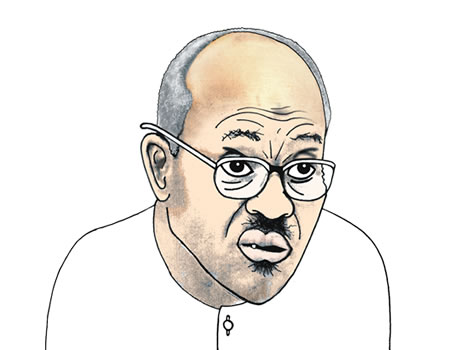These are dire times of insecurity in Nigeria as violent criminals are on the verge of imposing the rule of the jungle on the nation. And government seems to lie prostrate before the marauding army of murderous kidnappers, killer herdsmen, bandits, armed robbers, insurgents, ritual killers, cultists and sundry renegades, as fear stalks the land.
And then, you ask: Where is President Muhammadu Buhari? With a coalescence of calls for urgent action by all stakeholders – from the Northern Elders Forum, the Arewa Consultative Forum, South-West’s Afenifere, South-East’s Ohanaeze, the Middle Belt Forum to the Niger Delta Assembly as well as religious bodies – you expect the president to get on Action Station. The nation is, therefore, aghast at the apparent complacency of the Presidency. Even, the First Lady, Mrs. Aisha Buhari, has lamented the paralysis of the security agencies to contain the endemic nationwide violence. The president’s periodic summons of service chiefs to give them marching orders to tackle insecurity has been largely to douse people’s outrage, but this has remained cosmetic as violent criminality continues to escalate.
Convening meeting of governors followed the same ritual. So, the people are wondering at the president’s seeming apathy to the horrors being visited on the people by rampaging, violent extremists. At his second inauguration on May 29, people were expecting the president to thunder his resolve to tackle the myriad problems confronting the nation, especially insecurity, headlong, by effecting a shapeup of the overwhelmed security agencies and their leaderships. But it would seem that the president has unduly burdened himself with loyalty to his appointees, benefactors and friends, making sacred cows of them, at the expense of public governance and the people.
So, on inauguration day, what did we get – mum from Mr. President. He did not even think we deserve a thank you for re-electing him. Some said his speech was reserved for Democracy Day celebration on June 12. But May 29 was the day he assumed power for the second time; the day of his investiture with authority, the day his second Presidency started running; the day to show that it is a new dawn. That day became a yawn, an anti-climax. The president’s zone, the North-West, is being laid to waste by bandits, kidnappers and cattle rustlers, with Zamfara State, where thousands have been killed and others displaced, being the poster state of lawlessness where communities reportedly pay ransom to bandits.
And that is the home state of the Defense Minister, Mansur Dan Ali. You have the spectacle of a defense minister who cannot provide defense for his native constituency, rather, he was accusing defenseless emirs in his state of colluding with bandits; passing the buck. Then, the president’s home state of Katsina is also under siege of bandits, so much so that the terrified state governor, Aminu Masari, was afraid to hold public ceremony of his second inauguration. Even a district head in the president’s native Daura became a captive of the renegades. The insecurity siege doesn’t get closer to a sitting president. Yet, our president evokes a disconcerting equanimity, a stoicism that borders on fatalism, and a disposition of que sera sera (what will be will be). Many critics of President Buhari had charged him with parochialism in the appointment of heads of security agencies; they were described as being predominantly dominated by Northerners. But, as we can see, of what benefit have the appointments of these Northerners been to the longsuffering masses of the North who are the most ravaged by insecurity – from the North-East, North-West to North-Central?
In the current May/June, 2019 edition of TheNEWS magazine with a cover page caption: ‘Not Safe – Kidnappers, Bandits Terrorise Nigeria,’ political scientist, Professor Adigun Agbaje, had described President Buhari’s brand as “a brand of inaction.” This succinctly explains why insecurity has become an equal opportunity menace where every part of the country is a shareholder. The South, especially the South-West, which has been the last bastion of peace, is now getting sucked into the vortex of insecurity, as kidnappers threaten to overrun its six states, creating panic. President Buhari’s reported conversion to state and local government police as anti-dote to insecurity, while a welcome development, cannot be the panacea to current security nightmare, given that the process demands constitutional change which would take awhile.
In the immediate, therefore, the president needs to declare a security emergency, where all stakeholders, including traditional rulers, religious leaders and youth groups are engaged and organised into surveillance/intelligence cells. The current mechanistic approach of over reliance on the security forces has largely failed. Containing insecurity should be made a people’s battle.
There is also the issue of ‘absentee governors.’ State governors enjoy the flamboyance of office, but have largely abdicated their security responsibilities, finding it convenient to wail that they have no control over the security agencies. But does this stop them from organising their people into self-defence groups? All these crimes occur within states and jurisdictions of some police divisions. What stops governors from publicly putting on the spot and making accountable, Divisional Police Officers (DPOs) whose jurisdictions have become kidnappers’ haven? The forests where kidnapped people are kept belong to people and are within the domain of some traditional rulers. Why is it impossible for governors to hold such people similarly accountable? The security net has to be formally expanded. A major problem is that many ego-intoxicated governors, who are culture deviants, are more inclined to humiliating traditional rulers, rather than mobilising them for the public good.
President Buhari and the state governors who collectively have the primary responsibility for the protection of lives and property cannot continue to project a sanguine posture as violent criminals make life a living hell for the people. We ask: Where is their humanity?
Dr. Olawunmi, a public affairs analyst, writes via olawunmibisi@yahoo.com.






